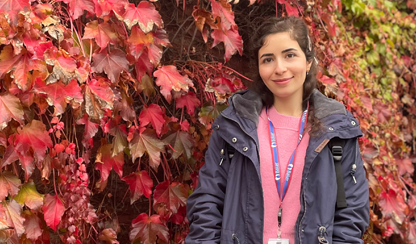
Parvin Yavari joined the Baker Institute in January to undertake her PhD in the Cardiovascular Inflammation and Redox Biology lab. Originally from Iran, Parvin was studying biology before securing a three-year Baker La Trobe scholarship. Getting visas to move to Australia has taken a while but she is now settling into life in inner Melbourne with her husband.
You've recently joined Professor Judy de Haan's group. Tell us what you are working on?
Our laboratory's research focus is on developing strategies to diminish cardiovascular complications in diabetic patients and improve their lives. I am performing research on diabetic cardiomyopathy, which is a heart muscle disorder in type 2 diabetic patients, potentially leading to heart failure and death. I am investigating the effect of an immuno-metabolite with potent antioxidant and anti-inflammatory properties on this disease condition. I aim to resolve inflammation and oxidative stress to prevent diabetes-mediated heart failure and improve diabetic cardiomyopathy.
It has taken a few years to get here. Tell us about that experience?
It's true, the journey to get to this point as a PhD student at the Baker Institute has been a long and challenging one. Like many international students, getting the visa, working hard to enhance my skills to become eligible for studying in esteemed universities, and securing the scholarships, each step was a challenge. But my motivation to perform research in my area of interest and work in a peaceful environment kept me focused.
When I arrived in Melbourne, I was fortunate enough to be offered my exciting PhD project by Prof Judy de Haan and start my work in her group. Now, as I begin this scientific journey, I'm thrilled to be part of such a dynamic research community and look forward to the discoveries that lie ahead.
You've come from Iran. What focus and investment in science is there in Iran at present?
Iran has been investing in various areas of science and technology, with a particular focus on biotechnology, stem cell research, and engineering disciplines like information technology. However, the country's scientific progress has been hampered by international sanctions and political tensions. These days, the sanctions have created obstacles for Iranian researchers, making it challenging to access cutting-edge facilities and equipment necessary for conducting advanced studies. Additionally, securing funding for research projects has become increasingly difficult in the face of these restrictions.
Your husband is also a scientist undertaking his PhD. How do two PhDs in one household cope?
Actually, it is a challenging but also rewarding experience.
We both understand the demands of academic life, so we're able to support each other but sometimes it is a bit difficult to manage everything in life. Especially when we're both immersed in experiments, approaching milestones, or simply dealing with the day-to-day stresses of academic life. In these moments, it's crucial that we share responsibilities like cooking and cleaning our apartment fairly 😊. We also provide our insights on each other's research which is helpful for both of us. At the end of the day, we're both passionate about our research, and we're excited to see what the future holds for us both in our academic careers.
What are you enjoying about life in Melbourne and Australia?
Life in Melbourne and Australia offers a dynamic blend of experiences we cherish. Melbourne's multicultural atmosphere made it easy for us to settle down and establish friendships! I am really interested in nature and specially in plants, so I really enjoy spending my time in nature, exploring the fascinating diverse plant species in Victoria. However, there is a lot to explore yet!






